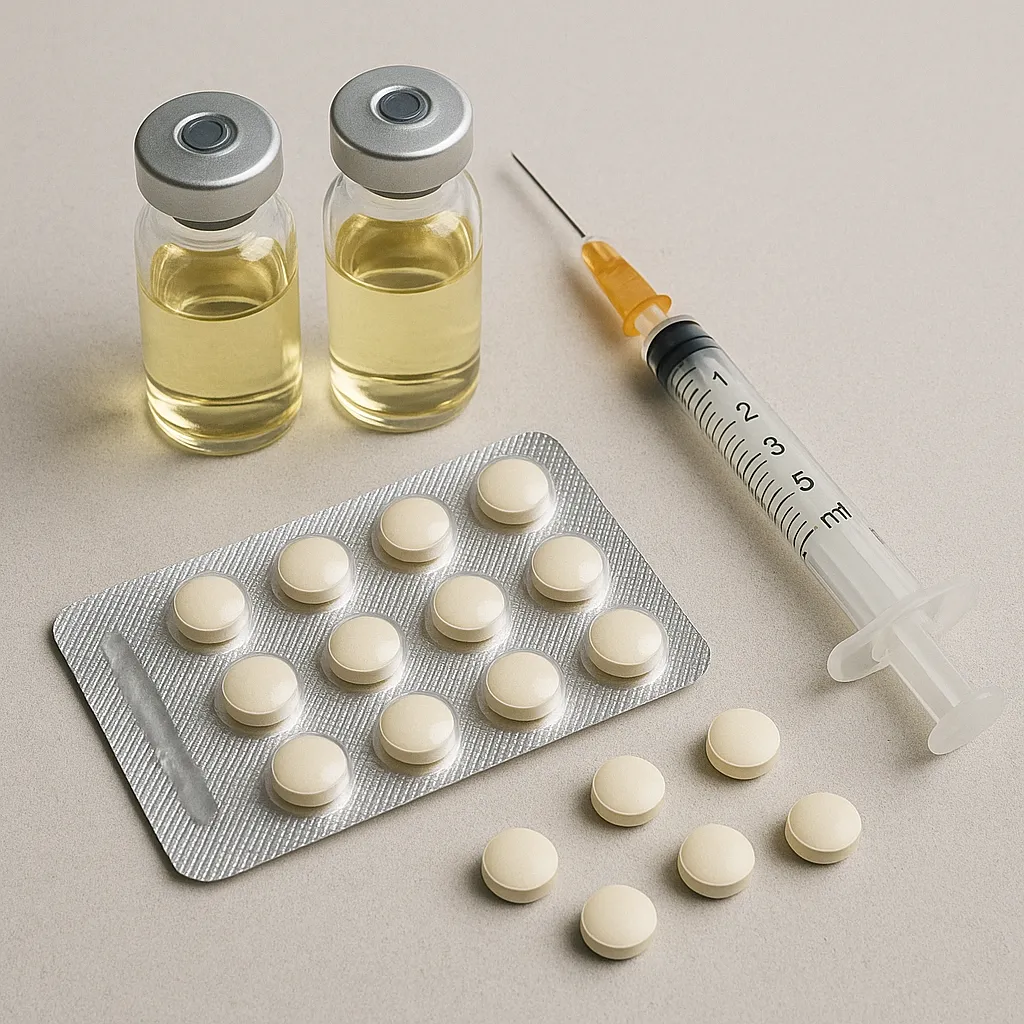



Hormones govern virtually every aspect of your health—from metabolism and mood to sleep and stress resilience. These powerful chemical messengers orchestrate the intricate symphony of cellular communication that keeps your body functioning optimally. Yet conventional approaches to hormone-related concerns often focus narrowly on managing individual symptoms rather than restoring balance to the entire hormonal ecosystem.
This limited approach can leave many patients caught in a frustrating cycle of persistent symptoms, medication side effects, and the nagging sense that something fundamental has been overlooked in their care. If you've experienced this disconnect, you're not alone—and there is a more comprehensive solution.
Your endocrine system doesn't operate as isolated glands producing independent hormones. Rather, it functions as an interconnected network where changes in one hormone inevitably affect many others. This complex web of relationships means that addressing hormonal issues effectively requires a systems approach rather than isolated interventions.
Consider these examples of hormonal interconnections:
These examples illustrate why treating isolated hormone imbalances without addressing the entire system often yields incomplete results.
When one hormone becomes imbalanced, the effects cascade throughout the body, creating seemingly unrelated symptoms that may be misdiagnosed as separate issues:
A woman experiencing estrogen dominance might simultaneously develop:
Conventional medicine might treat each of these symptoms with different medications, missing the common hormonal root cause. This approach not only fails to resolve the underlying imbalance but may actually worsen it through medication side effects and interactions.
Many patients struggle for years with symptoms that are actually rooted in hormone imbalances:
For Women:
For Men:
For Both:
These symptoms represent the body's attempt to communicate hormonal imbalances that require a more comprehensive approach than symptom suppression.
When hormone therapy becomes necessary, the type of hormones used significantly impacts both effectiveness and safety. The distinction between conventional synthetic hormones and bioidentical hormones represents a fundamental difference in approach.
Bioidentical hormones have exactly the same molecular structure as the hormones naturally produced by your body. This identical structure means your body recognizes and processes these hormones using its existing metabolic pathways.
In contrast, many synthetic hormones have altered molecular structures designed to make them patentable pharmaceutical products. These alterations may be subtle, but they significantly change how your body processes the hormone:
These molecular differences aren't merely academic distinctions—they translate to meaningful differences in how these hormones function in your body.
Your cells have specific receptors designed for your natural hormones. The precise fit between hormone and receptor determines the cellular response. Bioidentical hormones fit these receptors exactly as your natural hormones would, creating the same physiological response.
Synthetic hormones with altered structures bind to these receptors differently, potentially activating some functions while blocking others. This selective activity explains why synthetic hormones often produce a different pattern of effects and side effects than natural hormones:
These functional differences help explain why some patients experience significant side effects with conventional hormone therapies but tolerate bioidentical hormones well.
Perhaps the most significant advantage of bioidentical hormone therapy is the ability to personalize treatment with precision:
This personalization allows for precision medicine that addresses your unique hormonal landscape rather than forcing your body to adapt to standardized preparations.
The foundation of effective hormone therapy lies in proper assessment. Conventional hormone testing often includes only basic measurements that miss critical factors:
Conventional Approach:
Comprehensive Approach:
This thorough assessment provides the detailed information needed to design truly personalized treatment protocols.
Bioidentical hormone therapy offers solutions for numerous health challenges beyond the common applications of menopausal symptom management:
Perimenopause and Menopause Management Beyond Hot Flashes
While hot flashes often receive the most attention, hormonal shifts during perimenopause and menopause affect virtually every body system:
Addressing the full spectrum of perimenopausal and menopausal changes requires a comprehensive approach that considers all affected systems rather than focusing solely on the most obvious symptoms.
Men experience a more gradual but equally significant decline in sex hormones with age—a transition that impacts health and quality of life in profound ways:
Bioidentical testosterone therapy properly administered and monitored can address these changes, supporting men's health and vitality throughout the aging process.
Thyroid disorders affect an estimated 20 million Americans, yet conventional approaches often fail to restore optimal function:
Bioidentical thyroid therapy considers these factors to restore truly optimal thyroid function rather than simply normalizing basic lab values.
The adrenal glands produce hormones essential for stress response, energy regulation, and immunity—functions often compromised by our high-stress modern lifestyle:
Proper adrenal support creates the foundation for overall hormonal balance while enhancing energy, immune function, and stress resilience.
Insulin resistance affects an estimated 88 million American adults and creates far-reaching hormonal disruptions beyond blood sugar regulation:
Addressing insulin regulation creates a foundation for balancing the entire hormonal symphony, often resolving seemingly unrelated hormonal symptoms.
Sarah's journey illustrates the power of comprehensive bioidentical hormone therapy when conventional approaches fall short. At 43, Sarah was experiencing debilitating perimenopausal symptoms despite being prescribed standard hormone replacement therapy by her gynecologist.
Her symptoms included:
The standard HRT she'd been prescribed (a common combination of synthetic estrogen and progestin) had initially helped with hot flashes but did little for her other symptoms and eventually became less effective. Additionally, she experienced side effects including breast tenderness and headaches.
When Sarah sought functional medicine care, comprehensive testing revealed a more complex picture than her previous basic hormone panel had shown:
Rather than simply adjusting her existing HRT prescription, Sarah's functional medicine doctor developed a comprehensive protocol:
Within six weeks, Sarah reported significant improvements:
By three months, her follow-up testing confirmed objective improvements in her hormonal balance, and she reported feeling "like herself again" for the first time in years. The key to her transformation was addressing the entire hormonal system rather than focusing on isolated hormones or symptoms.
Effective bioidentical hormone therapy follows a systematic process designed to identify and address your unique hormonal needs:
Your hormone optimization journey begins with thorough assessment:
This comprehensive evaluation identifies patterns and connections that standard testing misses, providing the foundation for truly personalized treatment.
Based on your test results, symptoms, health history, and personal preferences, we develop a customized hormone optimization strategy:
This personalized approach ensures you receive exactly what your body needs rather than a standardized prescription that might not address your unique situation.
Hormone therapy is not a static prescription but a dynamic process that evolves with your changing needs:
This ongoing partnership ensures your hormone therapy continues to serve your changing needs throughout your health journey.
Hormones don't exist in isolation from the rest of your life—sustainable hormone balance requires supporting your entire physiology:
These lifestyle strategies enhance the effectiveness of bioidentical hormone therapy while building long-term hormonal resilience.
Our approach to hormone therapy prioritizes safety through several key strategies:
This careful approach maximizes benefits while minimizing potential risks, creating sustainable hormone optimization strategies.
Bioidentical hormone therapy represents a more nuanced approach to hormonal health—one that respects your body's natural processes while providing the support needed to restore optimal function. Rather than simply managing isolated symptoms, comprehensive hormone optimization addresses the root causes of hormonal imbalances to create sustainable wellbeing.
If you've struggled with persistent symptoms despite conventional treatments, or if you're seeking a more natural approach to hormonal transitions, bioidentical hormone therapy may provide the answers you've been seeking. Our personalized protocols are designed to restore the hormonal harmony that supports not just the absence of symptoms but truly vibrant health.
Don't settle for symptomatic band-aids when genuine hormone optimization is possible. Schedule your hormone assessment consultation today to discover if bioidentical hormone therapy could help you reclaim your vitality and quality of life.
- Dr. Ward